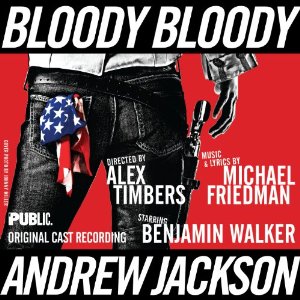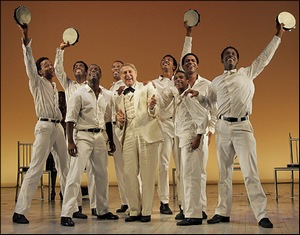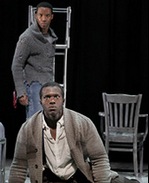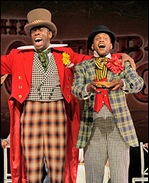SITE GUIDE
SEARCH
REVIEWS
REVIEW ARCHIVES
ADVERTISING AT CURTAINUP
FEATURES
NEWS
Etcetera and
Short Term Listings
LISTINGS
Broadway
Off-Broadway
NYC Restaurants
BOOKS and CDs
OTHER PLACES
Berkshires
London
California
New Jersey
DC
Connecticut
Philadelphia
Elsewhere
QUOTES
TKTS
PLAYWRIGHTS' ALBUMS
LETTERS TO EDITOR
FILM
LINKS
MISCELLANEOUS
Free Updates
Masthead
A CurtainUp Review
The Scottsboro Boys
By Elyse Sommer
The Scottsboro Boys Dances Uptown
Original Review Of the Vineyard Production
It's a pleasure to report that The Scottsboro Boys has met the challenge of that "looking lost" hurdle by choosing the Lyceum Theater as its Broadway home. This lovely, wood panelled theater comes as close to intimacy as you can get in this uptown neighborhood. The bare but elegant and stunningly lit scenic design fits the Lyceum like the perennial glove. The good news begins with having that razzle-dazzle showman John Cullum reprising his role as the master of ceremonies for the minstrel show that serves as the bizarre but colorful and apt frame for this grim but true story. That colorful setup is electrified by John Kander's jazz, ragtime and ballad infused score set to the witty lyrics of the late Fred Ebb. Director-Choreographer Susan Stroman's muscularly lean staging with its brilliant use of an assemblage of silvery chairs to set and re-set scenes, ranging from a railway car to a cage-like prison punishment box, still dazzles.
With a helping hand from costumer Toni-Leslie James, Colman Domingo and Forrest McClendon once again play the minstrel show's Mr. Bones and Mr. Tambo as well a handful of other characters. Most are villains but McClendon also takes on the New York lawyer Samuel Leibowitz who's bent on freeing the boys even though he doesn't excape Ebb's satirical bent ("Back in Manhattan ask anyone:/There's no bigger voice for equal rights than me/ I Fight for it!/I live for it!/Just ask my cook, Jemima/ Just ask my chauffeur Rufus/ Just ask our colored laundress/and I'm sure they'll agree"). Listening to the solo and ensemble numbers again, confirms the poignancy of "Go Back Home," the jazzy pizazz of "Hey, Hey, Hey!" and the cheekily satirical "Money." And, yes, there's an easily recognizable kinship to Cabaret and Chicago (Ruby and Victoria, the two hookers who falsely accuse the boys of rape evoke images of Roxy and Velma as Haywood's "Nothin'" is reminiscent of "Mr. Cellophane"). But my sense is still that this is less a case of this show being derivative rather than underscore its place as the concluding segment of a sassy and original musical trilogy about injustice. Some of Ms. Stroman's special directorial touches touches surprise and mesmerize all over again — the use of tambourines, the especially breathtaking shadow dance and electric chair numbers; also the way the genial Interlocutor is transformed into a trial judge and the Governor of Alabama. While The Scottsboro Boys has made the leap from a small downtown theater to Broadway without a stumble, the tricky question as to whether it will clear the financial hurdle of having to sell more and higher priced tickets, has yet to be answered. For all the singing and dancing, this is not a cheerful story, nor does it have sexy ladies or a romantic element. But neither is it the overly familiar standard fare geared to the tourist trade. Instead it joins musicals like American Idiot, Bloody Bloody Andrew Jackson and Next to Normal to prove that musical theater is a continually evolving art form. Broadway Production Notes The Scottsboro Boys Music and Lyrics: John Kander and Fred Ebb Book: David Thompson Direction and Choreography: Susan Stroman Cast: *John Cullllum (Interlocutor/ Judge/ Governor Of Alabama), *Colman Domingo (Mr. Bones/Sheriff Bones/ Lawyer Bones/ Guard Bones/Attorney General, Clerk), *Forrest McClendon (Mr. Tambo/Deputy Tambo/ Lawyer Tambo/ Guard Tambo/Samuel Leibowitz), *Forrest McClendon (Mr. Tambo/Deputy Tambo/ Lawyer Tambo/ Guard Tambo/Samuel Leibowitz), *Sharon Washington (The Lady), The Socttsboro Boys (and their various other parts ): Joshua Henry (Haywood Patterson), James D. Lane (Ozie Powell/ Ruby Bates), Josh Breckenridge (Olen Montgomery), Derrick Cobey (Andy Wright) Rodney Hicks (Clarence Norris, Preacher), Kendrick Jones (Willie Roberson/Electrofied Charlie), Julius Thomas III (Roy Wright/Electrofied Isaac/ Billy/ Cook), Jeremy Gums (Eugene Williams, Little George), Christian Dante White (Charles Weems/Victoria Price),Julius Thomas III (Roy Wright). Set designer: Beowulf Boritt Costume designer: Toni-Leslie James Lighting designer: Ken Billington Sound designer: Peter Hylenski Fight director: Rick Sordelet Music director and vocal arranger: David Loud Orchestrations: Larry Hochman Orchestra conductor: /Paul Masse Stage Manager: Joshua Halperin Running Time: 1 hour and 45 minutes without intermission Lyceum Theater, 149West 45th Street 212/239-6200 Tues - Sunday at 8pm; Saturday and Sunday matinees at 3pm Tickets: $39.50 to $131.50 Re-reviewed by Elyse Sommer at October 30th matinee press performance Closing 12/12/10 after 49 performances and 29 previews. Current Song List (Songs, are the same except for one cut—" It's Going to Take Take Time" — and the additon of a concluding reprise of "Minstrel March." ) Minstrel March /Orchestra Hey, Hey, Hey, Hey! /Company Commencing in Chattanooga/ Haywood, Scottsboro Boys Alabama Ladies /Victoria Price, Ruby Bates Nothin' /Haywood Electric Chair /Guards, Eugene, Electrofied Charlie, Electrofied Issac Go Back Home / Haywood, Eugene, Scottsboro Boys Shout! /Scottsboro Boys Make Friends with the Truth /Haywood, Billy, Scottsboro Boys That's Not The Way We Do Things/ Samuel Leibowitz Never Too Late /Ruby Bates, Scottsboro Boys Financial Advice /Attorney General Southern Days /Scottsboro Boys Chain Gang/Scottsboro Boys Alabama Ladies (Reprise) / Victoria Price It's Gonna Take Time / Interlocutor Zat So /Governor of Alabama, Samuel Leibowitz, Haywood You Can't Do Me /Haywood The Scottsboro Boys Scottsboro Boys Minstrel March (Reprise) Orchestra |
|
REVIEW FEEDBACK Highlight one of the responses below and click "copy" or"CTRL+C"
Paste the highlighted text into the subject line (CTRL+ V): Feel free to add detailed comments in the body of the email . . . also the names and emails of any friends to whom you'd like us to forward a copy of this review. |
John Kander and Fred Ebb more than deserve a place in the forefront of musical theater artists who turn stories that are more the stuff of serious dramas than shows with lively songs and and choreography. The corruption and violence rampant in Chicago during the 1920s inspired some of Ebb's most dazzlingly satiric lyrics and Kander's most razzle dazzle melodies. Their next serious yet seriously entertaining musical, Cabaret, revolved around another social evil, the German Nazi party's rise that led to World War II. Now, their last collaboration before Ebb's death, The Scottsboro Boys, completes what amounts to a stunning trilogy of musicalized fictional plays based on real events.
The shocking case of a group of African American teenagers who at the height of the Great Depression of the 1930s hopped a Memphis bound freight train hoping to find jobs. The were unlucky enough to be in the same train with two white women when it stopped in Scottsboro, Alabama, a place rife with virulent bigotry. The boys were unjustly accused of attacking two white women. Though their attempts to prove their innocence became a cause célèbre that helped to spearhead the civil rights movement and they escaped execution, their mistreatment and years of incarceration are more the stuff of an opera than a jazzy musical — unless, of course, that miscarriage of justice is being explored by that dynamic duo, Kander and Ebb.
The facts of the Scottsboro case — the repeated guilty verdicts in the face of evidence proving the innocence of these young men (one of whom is not yet fourteen) — are so shamefully bizarre that the only way to put it all into a musical format is to do something to match this outrageous miscarriage of justice. If Kander and Ebb's pathway into the story via a minstrel show strikes you as outrageous to the extreme, I suggest that you hurry up and get a ticket. Seeing will indeed have you believing in the brilliance and absolute rightness of the minstrel format. It works as the courtroom structure did for Chicago and the sleazy nightclub setting for Cabaret. David Thompson's book, Susan Stroman's zippy direction and choreography all serve to bring this tragic true story to vivid life. The talented cast's propulsive singing and dancing electrifies the stage and does full justice to the ragout of jazz, ragtime and ballads as well as the choreography.
If some of the songs and even the staging evoke Chicago and Cabaret, it doesn't take anything away from this production's freshness. That occasional feeling of familiarity is not so much derivative as a link that emphasizes my point about The Scottsboro Boys being the concluding installment of a trilogy of musicals that cast a satirical eye on horrendous examples of injustice and corruption and yet manage to be dazzlingly entertaining. While there aren't any instant hummers like "All That Jazz," "Mr. Cellophane" or "Money," jazzy ensemble numbers like "Hey, Hey, Hey, Hey!" and the poignant "Go Back Home" beg for repeat hearings.
The 13 performers, many of whom play multiple roles, deliver the goods as actors, singers and dancers. Naturally, it's a plus to have John Cullum, the only white cast member, as the interlocutor or MC of the Minstrel Show segments and also as Judge and Governor of Alabama. Cullum maybe eighty, but but his talent and charm are agelelss.
The most minstrel-ly and reprehensible but riveting characters are played by the extraordinary Colman Domingo and Forrest McLendon, whose Mr. Bones and Mr. Tambo have various permutations in the Scottboro boys' arrest, imprisonment and constant mistreatment. McLendon is also terrific as the Yankee legal eagle, Samuel Leibowitz. This character, based on a real New York lawyer who, as a result of the public furor over the case was sent to Alabama to conduct a new trial, is the subject of a song called "Financial Advice" that makes it clear that Jews weren't any more popular than black people in this ugly environment. ("When your bills ain't paid/And the goin's rough/And your bankbook says/You ain't got enough/ Let me tell you, sonny/ There's nothing like Jew money").
Typical of the minstrel genre, female roles (with the exception of Sharon Washington's mysteriously always present Lady) are played by men. Christian Dante White and Sean Brandford leave their Scottsboro Boy ensemble parts long enough to most effectively play this show's Roxie and Velma counterparts, Victoria Price and Ruby Bates. Their accusations made to circumvent their own troubles with the law eventually, but too late, weigh on Ruby's conscience as explained in "Never Too Late" ("Back then I was a homely phony/But now I change my testimony"). Haywood Patterson, the most tragic and fully fleshed out member of the Scottsoboro ensemble, is a star-making role for Brandon Victor Dixon.
Susan Stroman does admirable double duty as director and choreographer. She has the dancers segueing effortlessly back and forth between the straight drama and song and dance segments. Whatever the mood or the action, her design team makes sure it all looks terrific — whether relying on a few tambourines and the artful arrangements of a baker's dozen of chairs or for a wonderful shadow play number, "Make Friends With the Truth.quot; Toni-Leslie James's costumes add eye-popping color and flair. Kevin Adam's lighting is at its most astounding during the truly terrifying "Electric Chair" dream sequence. The excellent band, unobrusively tucked into the theater's side balcony, is never so loud that you can't hear the lyrics.
Like Chicago and even more, Cabaret, The Scottsboro Boys features some surprises which I'm honor bound not to spoil for you. Suffice it to say that the hour and forty minute nonstop production flies by as fast as those chairs on the Vineyard stage metamorphose from train to jail house, to courtroom, solitary confinement cell to bus.
Perhaps a comment by John Kander quoted in in a recent article about the somberness of today's musicals ("New Musicals Strike a Somber Note" by Felicia Lee, New York Times 3/02/10) best sums up why the marriage of this sadly true story with razzmatazz singing and dancing is so felicitous: "Music does things sometimes that words cannot do, and musical theater can do things that strict drama cannot do, which gives it a real capacity to understand and portray human suffering."
Amen!
The show played at the Vineyard Theatre 108 E. 15th St from 2/12/10 to 4/04/10, and had its original ; opening 3/10/10. Reviewed by Elyse Sommer March 6th press performance. The show's Broadway transfer leave the pcreative team in tact (with Ken Billington taking over from Kevin Adams for the very crucial lighting desighn and just a few cast changes. The departure of Brandon Victor Dixon to star in the musical based on the life of Ray Charles, Unchain My Heart is the major cast change. The songs are also the same and in the same order, with only one song, "Chain Gang," eliminated and a reprise of Minstrel March added for the finale.

TheScottsboro Boyse

Bloody Bloody Andrew Jackson

Slings & Arrows-the complete set
You don't have to be a Shakespeare aficionado to love all 21 episodes of this hilarious and moving Canadian TV series about a fictional Shakespeare Company




 Rodney Hicks and Joshua Henry
Rodney Hicks and Joshua Henry Colman Domingo as Mr. Bones and Forrest McClendon as Mr. Tambo
Colman Domingo as Mr. Bones and Forrest McClendon as Mr. Tambo